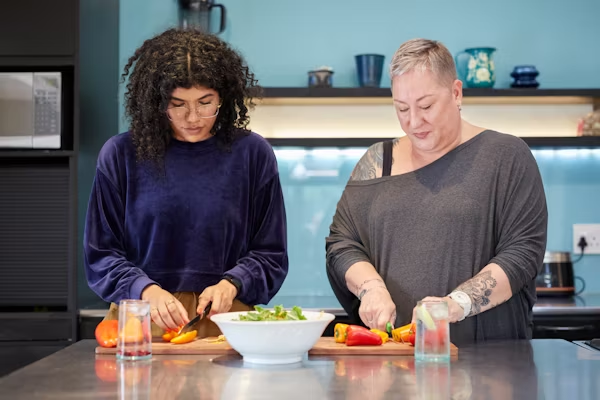Vague Advice Creates Guilt and Overwhelm
The phrases we hear so often, “Just eat better,” or “You need to move more”, aren’t inherently wrong. But they’re incredibly unhelpful when they’re not followed by actionable support.
In Australia, more than 80% of adults don’t meet national guidelines for fruit and vegetable intake. At the same time, around 64% of adults are overweight or obese, according to the Australian Institute of Health and Welfare (AIHW, 2023). Many women know the importance of nutrition and exercise but feel stuck on how to apply this consistently in their day-to-day lives.
The same is true for stress. Chronic stress is linked to a range of health issues, from anxiety and insomnia to heart disease and gut problems. But telling someone to “stress less” without showing them how is like telling someone to “just breathe underwater”, useless unless you hand them the right gear.
And unfortunately, vague advice often leads to:
- Feelings of failure when the advice doesn’t translate to results
- Cycles of starting over after each failed diet or program
- Shame and guilt, assuming the problem is “lack of willpower”
Lifestyle Medicine Provides a Framework That Works
Unlike traditional models of care that often focus on medications and short-term interventions, Lifestyle Medicine offers a sustainable, evidence-based solution. It focuses on six core pillars that are foundational to long-term health:
The Six Pillars of Lifestyle Medicine:
- Whole-food nutrition – Tailored to individual needs, preferences, and cultural contexts.
- Physical activity – Encouraging consistent, enjoyable movement.
- Restorative sleep – Prioritising quality and duration of sleep.
- Stress management – Evidence-based strategies like breathwork, cognitive-behavioural techniques, and mindfulness.
- Positive social connections – Building emotional resilience through relationships.
- Avoidance of risky substances – Reducing alcohol, smoking, and ultra-processed foods.
These are not one-size-fits-all rules. They’re adaptable pillars that form a roadmap, one that respects the complexity of your life, especially during midlife transitions.
Evidence Behind the Framework
In the 45 and Up Study, Australia’s largest ongoing research into healthy ageing, those who engaged in regular physical activity, ate a healthy diet, and maintained social connections were significantly less likely to develop chronic disease or require hospital care.
Another report from the Australian Longitudinal Study on Women’s Health (ALSWH) found that women with healthier lifestyle behaviours had better mental health scores, fewer medications, and lower healthcare costs over time.
Put simply: these six pillars aren’t just common sense, they’re clinically proven pathways to better health.

Support and Structure Are the Missing Pieces
When it comes to changing habits, most people assume they lack willpower. But we know that support, environment, and structure play a far bigger role than motivation alone.
That’s why I created the Women’s Lifestyle Reset Program, a tailored health support system that goes beyond vague advice and helps you create real, sustainable changes.
Here’s what’s included:
Personalised Assessments
We start with a comprehensive look at your health history, lifestyle habits, hormones, mental health, goals, and optional blood tests or scans. This isn’t about generic checklists. It’s about understanding your life, your body, and your challenges.
Structured Weekly Plans
Each week, you’ll get a clear focus area with practical actions to try, grounded in science, but flexible enough for real life. From meal planning to mindset shifts, the weekly content helps you build momentum without pressure. It’s not about doing everything perfectly, it’s about making room for life’s unpredictability, school drop-offs, work deadlines, bad sleep, or family dramas.
Evidence-Based Education
We break down the science of nutrition, hormones, exercise, gut health, and stress in digestible, easy-to-understand ways, so you know why we’re doing what we’re doing.
Coaching & Community
Weekly check-ins, small group sessions, and 1:1 support help you stay accountable and motivated, without shame or pressure. You’re surrounded by like-minded women on the same journey.
Practical Tools
We provide food templates, journal prompts, stress regulation tools, movement options, and habit trackers, because you don’t need more information, you need implementation tools.
Results? They Speak for Themselves
After just the first few weeks of the Women’s Lifestyle Reset Program, participants shared powerful reflections on what was most helpful:
- The reassurance of starting small and letting go of perfectionism was one of the most valuable takeaways for many.
- Participants felt safe, seen, and supported from the very beginning, creating the foundation for meaningful change.
As a GP, this kind of change is deeply satisfying. We’re not just managing symptoms, we’re building resilience from the inside out.

Why This Is Especially Important for Women Over 40
This stage of life through perimenopause, menopause and beyond brings unique health challenges, yet mainstream advice often overlooks them.
Hormonal Changes
Shifts in oestrogen and progesterone affect everything from mood and weight to sleep, metabolism, and mental clarity.
Increased Stress Loads
Many women in this age group are managing households, careers, ageing parents, and hormonal changes, all while trying to maintain their own health.
Rising Risk for Chronic Disease
According to the AIHW, Australian women aged 45-64 are at rising risk of:
- Heart disease
- Type 2 diabetes
- Autoimmune conditions
- Mental health disorders
Now more than ever, women need real, practical, ongoing support, not “eat better and stress less.”
So… What Can You Do Right Now?
Here are 3 evidence-backed steps you can take today:
1. Reframe Your Mindset
Recognise that you don’t have to “fix everything at once.” Sustainable change happens one step at a time, with compassion. Drop the all-or-nothing thinking.
2. Start With One Pillar
Choose one area like sleep, stress, or movement and focus there. You’ll often see improvements in other areas as a ripple effect.
Example: Better sleep improves energy, which improves food choices and movement motivation.
3. Seek a Framework and Support
Whether it’s with your GP, a health coach, or a structured program like the Women’s Lifestyle Reset, don’t go it alone. Support and structure help you stay consistent, realistic, and compassionate with yourself.
Final Thoughts: It’s Time to Replace Guilt With Guidance
If you’ve been told to “just eat better” or “try to move more,” and that advice has left you feeling overwhelmed or defeated, please know this:
- You’re not lazy.
- You’re not failing.
- You’ve just been given the wrong kind of help.
The truth is, health isn’t a to-do list, it’s a set of learnable skills and habits that flourish with the right guidance.
Lifestyle Medicine gives us the map. Programs like mine offer the support, systems, and community that make it achievable.
You deserve more than vague advice. You deserve a plan that works for you.
Want to know more about the Women’s Lifestyle Reset Program?
Click here or book a free 15-minute discovery call to explore if it’s right for you.






